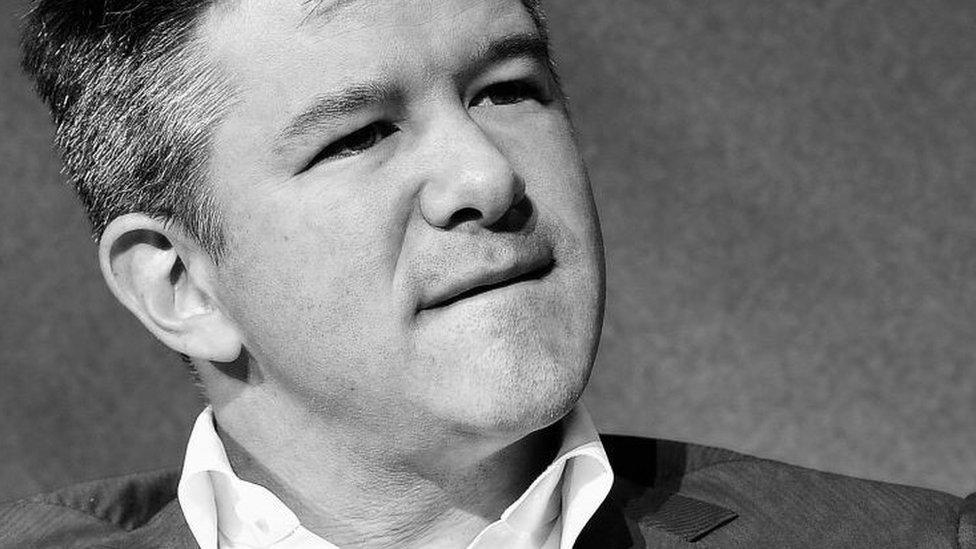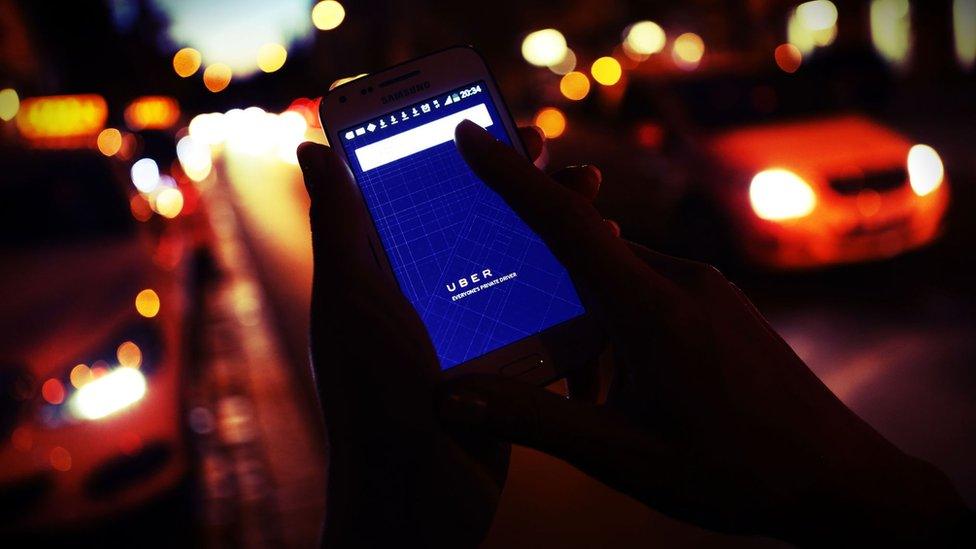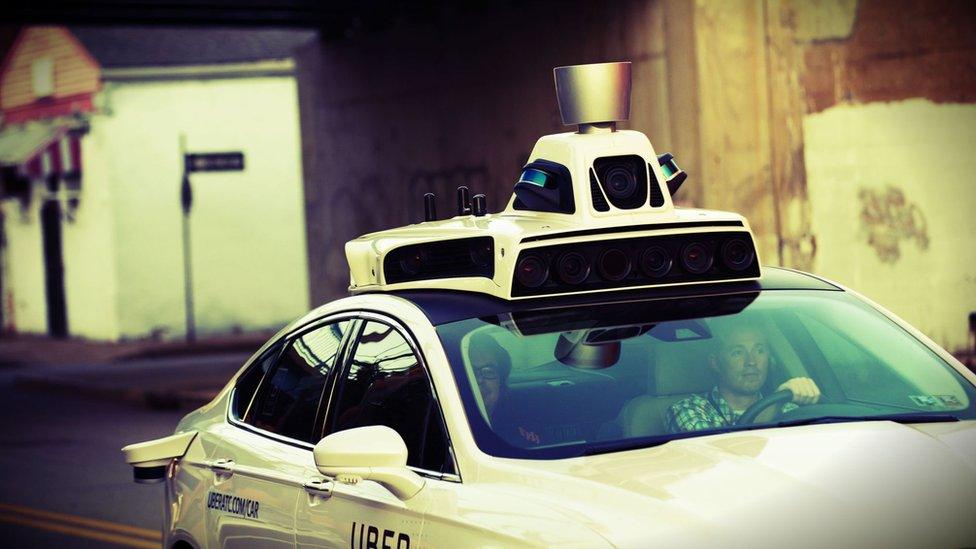Uber's mess reaches beyond sexism - and Silicon Valley
- Published
- comments

Travis Kalanick has had tense meetings with his staff
Uber's meteoric rise was dogged by incessant lawsuits, enraged protests and staggering losses. Or, as co-founder Travis Kalanick might consider it right now, the "good old days".
He now faces tougher challenges. This week began with Uber opening an investigation into serious, systemic sexual harassment, and ended with being dramatically sued over claims its self-driving company stole technology from Google.
Uber's long been a company synonymous with the worst traits of Silicon Valley. Hyper-aggressive business practices and a ruthless approach to competition have seen it constantly at war with governments, as well as the industries it has disrupted so devastatingly in what feels like the blink of an eye.
The level of shock expressed last weekend, when former employee Susan Fowler detailed what she said was rampant discrimination at the firm, was perhaps matched in volume by those saying "I told you so".
Much of the frustration directed at Uber has been because it took a barrage of negative press to kick the company into action over a culture most often described, by insiders and out, as "toxic".
In an attempt to repair some of the damage, Mr Kalanick stood in front of his staff on Tuesday and offered - according to a person at the meeting - an emotional "we must do better".
Later in the week, a group of around 100 female engineers had a further meeting with Mr Kalanick, audio from which was obtained by Buzzfeed, external. His staff told him no investigation was needed to expose problems at the company, he just had to start "listening to your own people".
"Fair enough," came the reply.
'Forced out'
What will have become clear to Mr Kalanick at that point is that for the first time in the company's history, "more money" is no longer his quick fix.
This story has so far been focused on San Francisco, where Uber is headquartered, and the location where Ms Fowler worked.
But shortly after the allegations came to light, several former Uber employees contacted the BBC with concerns about how the company was operating in its offices around the world. All requested to remain anonymous.
In 2014, Uber - by this point five years old - began operating in Singapore, which became its hub for operations across Asia.
"It's definitely a much wider problem than just in the United States," one source, a former employee at the Singapore office, told me.
He said problems began emerging as the company began to experience "completely insane growth".

Uber has offices - and problems - across the world
"They grew so quickly they just weren't equipped. At the beginning there were just no formalised HR processes, nothing of the sort."
In Ms Fowler's blog post, she alleged her performance review scores were retrospectively lowered to make it look like she had been underperforming.
This was a tactic familiar to many at the company.
"[I] had a written performance review," my source said.
"It had all been stellar, fantastic, and then randomly at some point, two weeks later when I get the ratings sent to me, it was just completely different."
Another former employee spoken to by the BBC worked for Uber in a major European city - though requested we did not cite the specific country as the team was small.
She said instances of "threatening behaviour" between staff were reported, but "no action was taken". She added that there was a "lack of support" or "any kind of empathy" for employees that felt threatened.
"I hope [the] investigation will somehow help the employees but I highly doubt it," she said
'Nothing was done'
That investigation, announced last Sunday, is being led by Eric Holder, who formerly served under President Obama as attorney general - the highest-ranking law enforcement position in the US.
Uber has not said when Mr Holder will report back, but has pledged the investigation will swift and thorough.

Uber has been accused of using tech stolen from Google
When contacted by the BBC about the scope of the investigation, an Uber spokeswoman would not discuss whether it would be looking at potential issues outside of the US.
Many have criticised Uber over the specifics of the probe. Mr Holder has worked for the company in the past - offering legal advice in the firm's battle to avoid having to gather fingerprints when vetting drivers.
Also part of the investigation team is Arianna Huffington, best known as co-founder of the Huffington Post, and currently a member of Uber's board.
Leading the frustration at Uber's response are Mitch and Freada Kapor from Kapor Capital, investors in Uber since 2010.
"We are disappointed to see that Uber has selected a team of insiders to investigate its destructive culture and make recommendations for change," the couple wrote.
"To us, this decision is yet another example of Uber's continued unwillingness to be open, transparent, and direct."
'Stolen' tech
Another of Uber's investors has been lashing out in a very different way.
Google Ventures may have led a $268m funding round for Uber in 2013, but that stake counted for little on Thursday.
Waymo, a company spun out from Google's self-driving team, sued Uber-owned autonomous company Otto, alleging it stole its LiDAR technology - the system used by self-driving cars to "see".
Waymo had been working on its LiDAR for several years, but Otto was created just last January. It was snapped up by Uber for $680m just a few months later.
Thanks to a mistakenly sent email, Waymo said it got hold of technical drawings relating to Otto's LiDAR technology. They allege that Otto co-founder Anthony Levandovski downloaded around 14,000 confidential files just before he left Google.
Uber has strongly denied the claims, calling them "baseless". But should it lose the case, the repercussions could be a costly and time-consuming dent in its self-driving ambitions. Not only could the damages reach into the many hundreds of millions of dollars, but Uber would also potentially need to look elsewhere for its LiDAR technology.
Culture shift
While workplace culture and a legal battle over self-driving technology may not seem directly related, both represent new ground for Uber: they are problems that won't simply go away if Uber turns to its usual tactics of aggression or evasion.
Both also represent a major thorn in the side for Uber's aspirations to be a publicly traded company.
The sexism row was "really starting to affect how we perceive the company and its public persona" said Kate Mitchell, co-founder and partner at Scale Venture Partners, speaking to CNBC.
Based on investments to date, Uber is currently valued at $68bn. Going public with its current problems could drag down its initial stock price. Investors may not be keen to get on board with a company facing one serious lawsuit over intellectual property, and the potential for financial fall-out due to its workplace culture.
But Uber does still have one thing going for it - popularity of the product.
Despite numerous calls for a boycott, and the anger of some drivers who feel they are being short-changed, the reality is that Uber has reinvented public transport in a manner which makes it almost impossible to turn back. Regular readers of this column may remember me considering whether Uber may even be too big to fail.
Indeed, even the people I spoke to who were angry at Uber's culture expressed an admiration for what the company had achieved and that shows no sign of waning yet.
"It's a company I truly love," said a former employee. "And I just hate to see where it's at."
Follow Dave Lee on Twitter @DaveLeeBBC, external and on Facebook, external. You can reach Dave securely through encrypted messaging app Signal on: (628) 400-7370